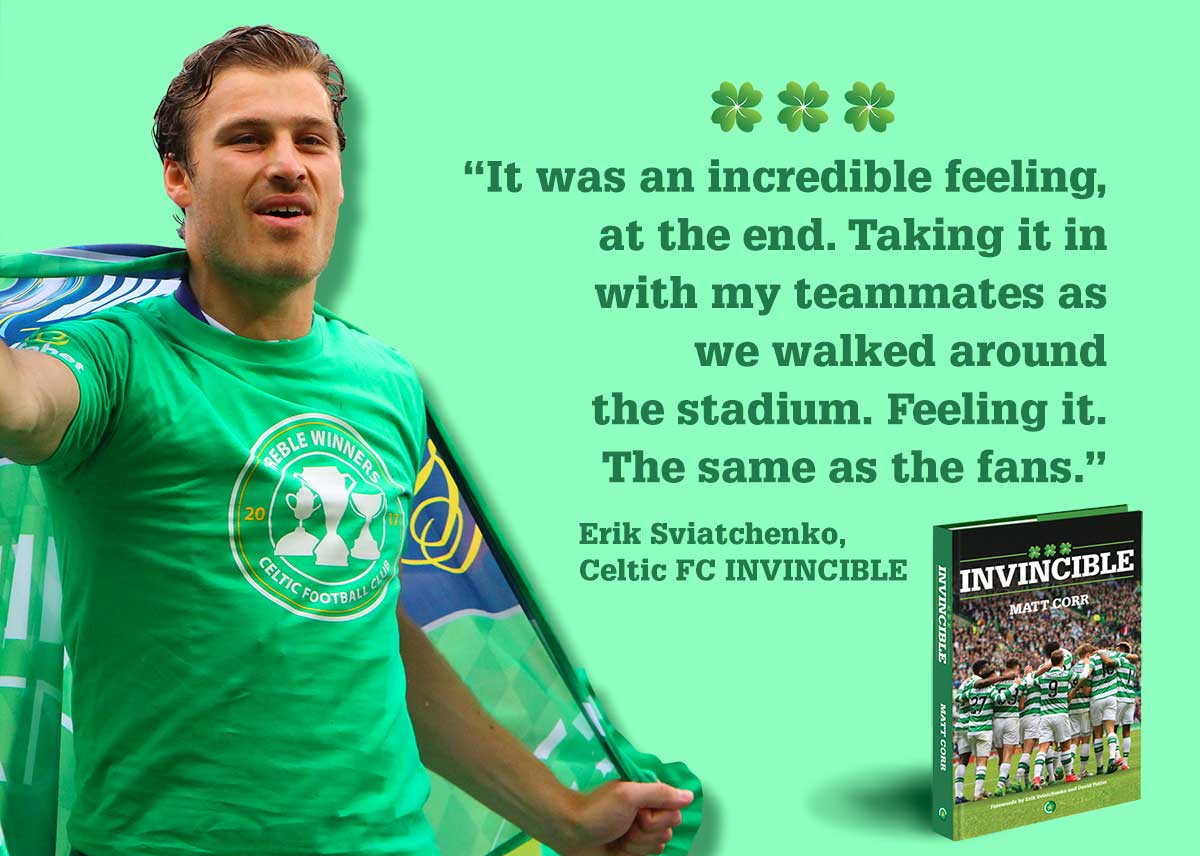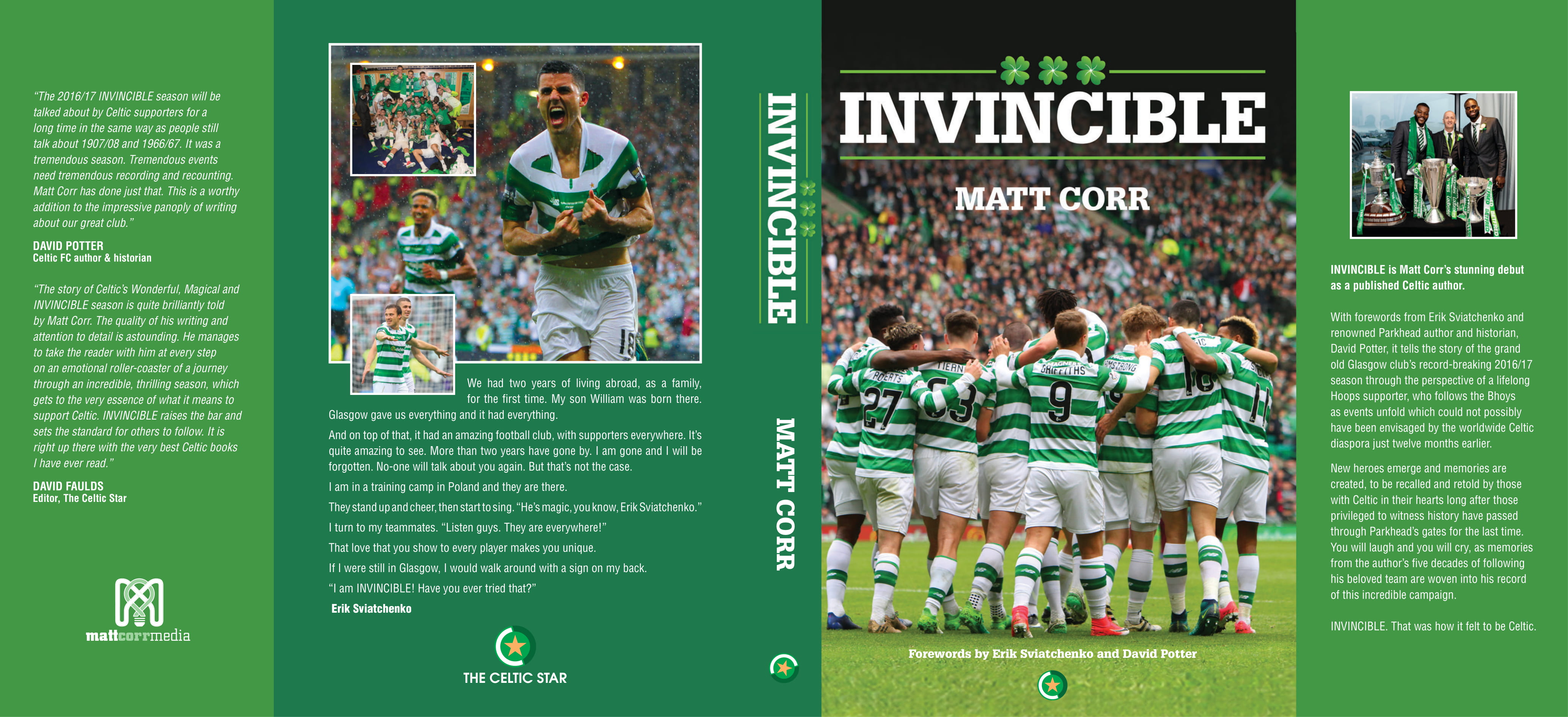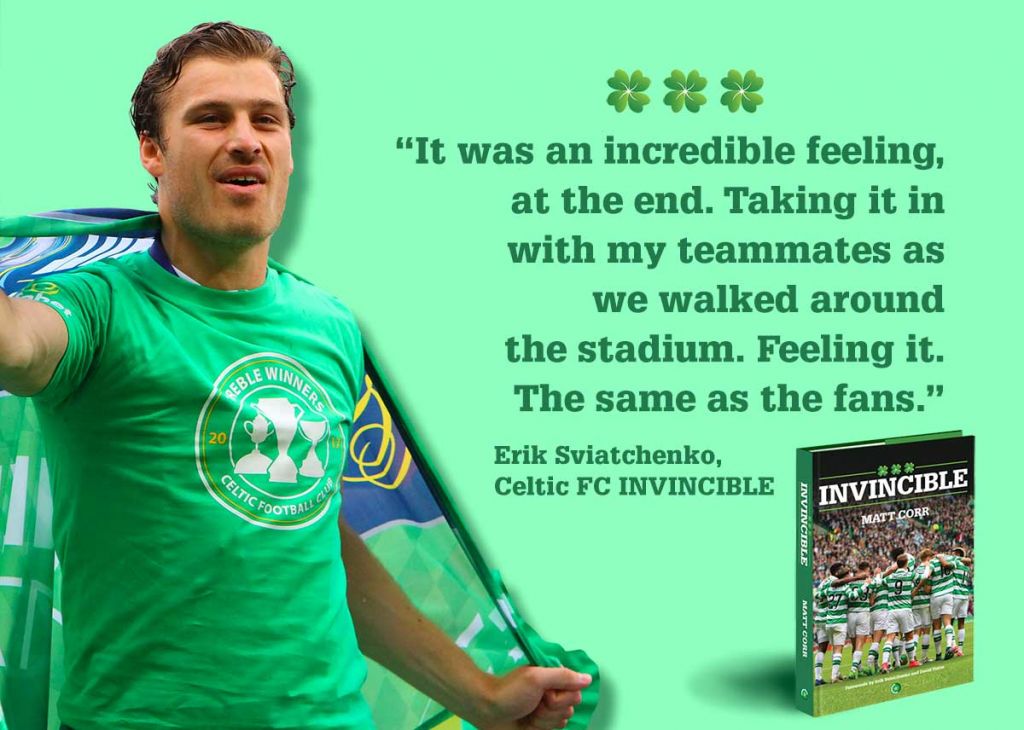“Moussa’s back-to-back trebles exorcise the A9 demons” is an extract from INVINCIBLE, Matt Corr’s outstanding debut as a Celtic author. This weekend and into next week we are offering Celtic supporters the opportunity to order a copy of Matt’s book, which documents every kick of the ball in that remarkable 2016-17 season under Brendan Rodgers, and have Matt add a personal dedication for you.
That’s pretty cool in itself but what is extra special is that ALL the money you pay (outside of the postage) will be donated on your behalf to The Kano Foundation!
So if you want to do your bit to make sure that The Kano Foundation continues to bring all these kids along to Paradise for their first taste of watching Celtic then this is your chance. And by ordering Matt’s book you’ll get a wonderful Celtic read about the most remarkable season since the year the Lions roared in Lisbon.
Since Celtic were up at Perth today to play St Johnstone, here’s the story of what happened in the corresponding fixture that season and it was extra-special.
One of the fun aspects publishing this particular book has been the Celtic players, their families and friends – oh and the former manager too – buying a copy or in some cases half a dozen copies. They all know that Celtic’s Invincible season was unique, never to be forgotten and Matt Corr has done an amazing job telling the story.
So enjoy “Moussa’s back-to-back trebles exorcise the A9 demons” by Matt Corr and if you want to order your own copy of INVINCIBLE, Matt will be happy to add the personal dedication of your choice then the money will be donated to The Kano Foundation. You can order your copy using by clicking on the image below.
“Moussa’s back-to-back trebles exorcise the A9 demons” an extract from Matt Corr’s INVINCIBLE
February began with a midweek visit of Aberdeen to Celtic Park, the Dons seeking to end a run of 23 consecutive League defeats in the east end of Glasgow enduring over 13 years, an unthinkable sequence for those of a certain vintage, recalling the days when any victory in this fixture was a cause of much celebration. There was a sense of déjà vu with the eventual outcome, as a second-half header from the rejuvenated Dedryk Boyata secured the points for Celtic, the only goal of the game, just as it had been seven days earlier against St Johnstone at the same venue. Thus, Rodgers’ men extended the winning run to 18 League matches, as the unbeaten domestic record stretched to 28 and counting.
The Irishman had made just one personnel change from the weekend victory over Hearts, Mikael Lustig replacing Cristian Gamboa as he adopted a “back three”. This allowed Kieran Tierney and James Forrest to attack on the wings of a midfield quintet, with Scott Sinclair and Patrick Roberts leading the line in the continued absence of regular frontmen Moussa Dembele and Leigh Griffiths. The formation worked well, Tierney time-after-time getting change out of his marker, winger Jonny Hayes, as their normal roles were reversed, and unlucky to see his right-foot effort clear the bar, having made the space with yet another searing run down the left. Sinclair was surely inches away from opening the scoring just before the break, Aberdeen midfielder Ryan Jack trailing back to pick his pocket and knock the ball out for a corner, just as Scott prepared to pull the trigger on Roberts’ sublime set-up pass.
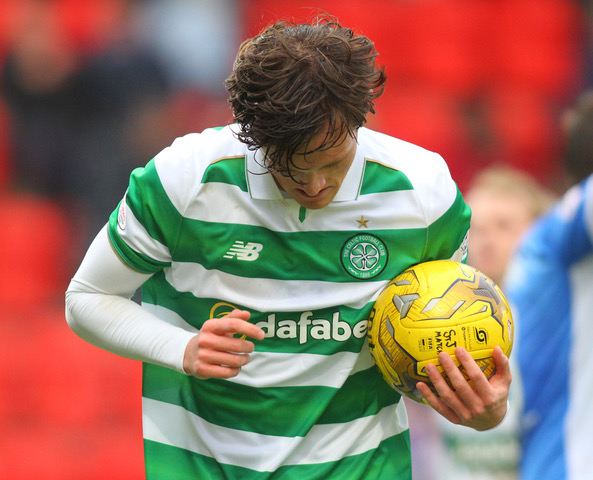
The breakthrough came 12 minutes into the second-half, Hayes fouling Tierney to allow Sinclair to deliver a free-kick from the left flank, his delicious cross met by the towering Boyata, who rose highest to power a near-post header past Joe Lewis, as Parkhead erupted. The English striker was then denied the goal his performance deserved for a second time, checking inside his defender to curl a beautiful shot past the Dons keeper but against the crossbar. There would be no further chances of that ilk at either end, Celts managing the game out professionally to move a whopping 25 points clear of Rangers, who had suffered a 4-1 mauling at Tynecastle the same evening. Aberdeen were a further two points back, having played one game less, still very much in the running for a second-place finish.
Four days later, on Sunday, 5 February 2017, Celtic travelled to Perth for a second clash in 11 days with St Johnstone, the midweek Parkhead game having been deferred due to the League Cup Final in November. In 50-plus years of following Celtic, Saints had featured in more than a few memorable matches. I first recall a glorious sunny day in August 1969, when over 60,000 crammed into the old ground to see the League Championship flag unfurled for the fourth successive year, before the clubs fought out a 2-2 draw. Such an attendance was unusual in itself, as other than Rangers or European ties, only a couple of games against Aberdeen over the next few years would draw similar crowds to Celtic Park, where 25-30,000 was the order of the day. To watch Stein’s teams. How times change.
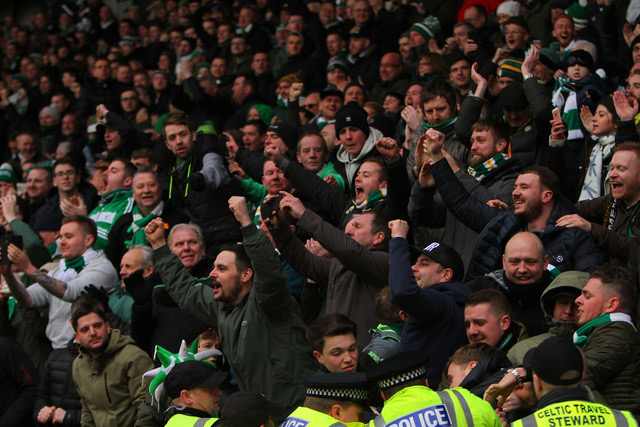
This was the era of St Johnstone’s greatest side, under Willie Ormond. They would lose out to an early Bertie Auld goal a matter of weeks later in the Scottish League Cup final, their first appearance in a major final at Hampden. Their League form would peak with a third-place finish behind champions Celtic and Aberdeen in 1971, Saints then returning to Glasgow that September to inflict a rare home defeat on Celtic, thanks to a John Connolly goal. Both Connolly and his successor, Jim Pearson, would later secure big-money moves to Everton, with Pearson’s post-playing career including a lengthy spell as Nike’s Head of Football, as they established a foothold in the UK. The Perth side would enjoy their finest European hour in 1971/72, knocking out Germans SV Hamburg and Hungary’s Vasas Budapest, before succumbing to Zeljeznicar Sarajevo in what was then Yugoslavia, now Bosnia & Herzogovina. St Johnstone’s fortunes would take a dip after Ormond succeeded Tommy Docherty as Scotland boss in 1973, and it would be the best part of thirty years before continental football returned to Perth.
Saints would taste only the occasional victory over Celtic in Glasgow in the years to follow. I suspect by far the most enjoyable match for myself and most long-suffering Bhoys from those horrible nineties – the decade from Hell – was the day we “stopped the ten,” in May 1998, Wim and Murdo’s side of Larsson and Brattbakk, Lambert and Burley, Rieper and Stubbs and baby-faced assassins, McNamara and Donnelly, providing some brief respite in an otherwise trophy-barren era. But their supporters would be celebrating in that same Celtic Park arena 16 years later, when the Perth side, under current manager Tommy Wright, won its first and, to date, only major piece of silverware, beating Dundee United 2-0 to lift the 2014 Scottish Cup. Wright’s underdogs had disposed of Celtic’s conquerors, Aberdeen, in the semi-final at Ibrox, before defeating bitter Tayside rivals, United – now managed by that same Jackie McNamara and featuring a trio of soon-to-be Celts, Gary Mackay-Steven, Stuart Armstrong and Nadir Ciftci in their starting line-up – to finally lift the famous old trophy at Parkhead.
Whilst Celtic’s home record overall had been impressive, away games were a different matter entirely. St Johnstone’s Muirton Park had proved one of the trickier away venues over the years, with Celts suffering several defeats and earning a few hard-fought victories, perhaps most memorably that dark day in January 1976, when a last-gasp, diving header from Johannes “Shuggy” Edvaldsson snatched a 4-3 victory for Sean Fallon’s Celtic, who had come from behind three times to stay in the match with the ultimately-relegated Saints, in the first-ever season of the Premier League. That was a happy journey home on the Cairn CSC minibus, which bore the moniker “Shanks’ Pony”, a play on the owner/ driver’s name. Bill Shanks drove us all over the country for years and had the happy knack of parking closer to the stadium than anyone else. In those days, trips to Perth invariably involved a visit for the “dads with sons” to a city centre tearoom, whilst the single men hit the pub. These were fantastic, formative Celtic years for me, which I look back on most fondly. The Cairn was a close-knit bunch of supporters, good guys, some of whom I still see at Celtic Park, although most of the original members, such as my dad, John Mullen, Archie Grant and Frank Dolan, are sadly long since gone. God rest them.
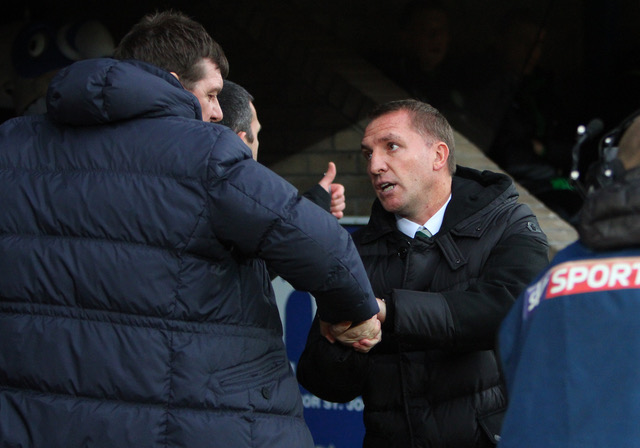
With the opening of a new Celtic Supporters Social Club in Springburn in the mid-’70s increasing the demand for membership of the buses leaving the area to follow the Bhoys each week, the Cairn finally relented to requests to extend to facilitate a full-size coach to games. At 18 years old, I was appointed club treasurer in the summer of 1979, as the new era was launched, following in my dad’s footsteps and mirroring his position in the “Celtic Club” which he and others had fought so hard to establish.
St Johnstone had struggled since that relegation, three years earlier. Indeed, it would be 1983 before they would return to the top-flight. The extended Cairn did make the trip to Perth in August 1981, just a few days after Willie Garner Saturday, when the Hoops-mad defender made a nightmare debut in a home League Cup section-opener against the other Scottish Saints, St Mirren, scoring two own goals in a 3-1 defeat. The Muirton match pitched Billy McNeill’s champions Celtic against second-tier St Johnstone, with all nostalgic thoughts of our long-awaited return to the old ground disappearing as a teenage Alastair McCoist notched the first of what would be many damaging goals against the Hoops. Celts would lose 2-0 on the night and would exit the competition at the section stage, despite four successive and emphatic wins in the remaining group games against the two Saints and Hibernian.
If that was bad then worse was to follow on my first visit to McDiarmid Park, in December 1990. Saints had sunk to the very depths of senior Scottish football after successive relegations in the mid-’80s, before fresh investment and a relocation to land donated by a local farmer, Bruce McDiarmid, revived their fortunes. Their new all-seater 10,000-capacity stadium, the first such constructed in the UK and opened in August 1989, was the catalyst for the modern-day Saints, the Perth club winning promotion to the Premier League in the first season at their new home. Three days before Christmas, an under-fire Billy McNeill, now in the difficult post-Centenary period of his second spell in charge at Parkhead, took his struggling Celtic side to McDiarmid. Dad had been invited to hospitality by one of the suppliers to the social club and, wonderfully as I thought at the time, was encouraged to bring his son along. More alcohol was probably the last thing I needed the morning after the office Christmas party but sometimes duty calls, so suited and booted, I sat quietly in the back seat as we made our way to Perth.
After a nice lunch and some “squaring-up” beers, the afternoon went rapidly downhill. Saints striker Steve Maskrey scored in the first minute and they were 2-0 up within a further five, Harry Curran’s fierce 25-yard shot beating Pat Bonner all ends up as Celtic faced a third successive League defeat and, incredibly, a sixth loss in nine games. John Collins’ strike early in the second half provided some brief hopes of a comeback before a third home goal from Tommy Turner just after the hour killed us off. Tommy Coyne, as he often did, then netted to pull it back to 3-2 from a Peter Grant through ball as we approached the last fifteen minutes of the game but that was as good as it got.
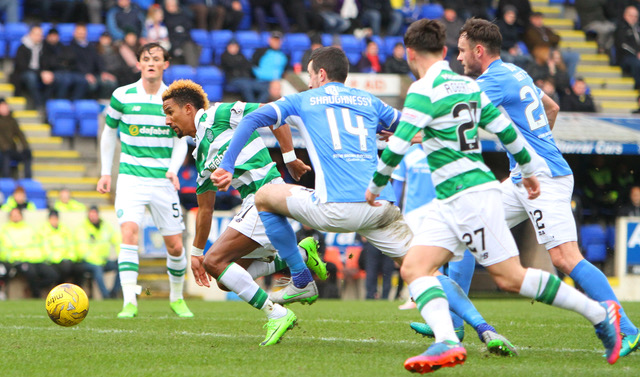
Billy and I would return to Perth for the final fixture of that dreadful 1990/91 season, Celtic twice coming from behind to gain a degree of revenge by edging a five-goal thriller. As in the December match, the home side were ahead straight from the kick-off, through Roddy Grant, before Charlie Nicholas levelled things in the 17th minute. And Saints made a similarly blistering start to the second period, David Bingham making it 2-1 from Grant’s knockdown before most of the 9,500 spectators had retaken their seats. Mike Galloway’s cute lob on the hour-mark levelled things again then with just 11 minutes remaining, Coyne was fouled in the box. The striker dusted himself down before blasting home his 18th and final goal of the season, securing the two points for Celtic.
The 3-2 victory in Perth, combined with a stoppage-time Dunfermline Athletic winner against Dundee United, ironically scored by ex-Celt David Moyes, enabled McNeill’s Celtic to finish two goals ahead of the Tannadice club in third place, despite losing 12 of their 36 League games, thus claiming an unlikely UEFA Cup slot. However, my memories of that game are that the focus for most Celts was on events at Ibrox, where two Mark Hateley goals handed Rangers a third successive title. Their opponents that day, Alex Smith’s Aberdeen, had arrived in Govan needing just a single point to clinch the flag. Cesar’s Centenary champions of just three years earlier had now gone two seasons without silverware and were now depending on others to prevent their traditional rivals from stacking up the domestic trophies. It had been a swift, painful decline and it would prove the downfall of one of our favourite sons. Within days, Billy McNeill had left the manager’s office at Parkhead for the second and final time.
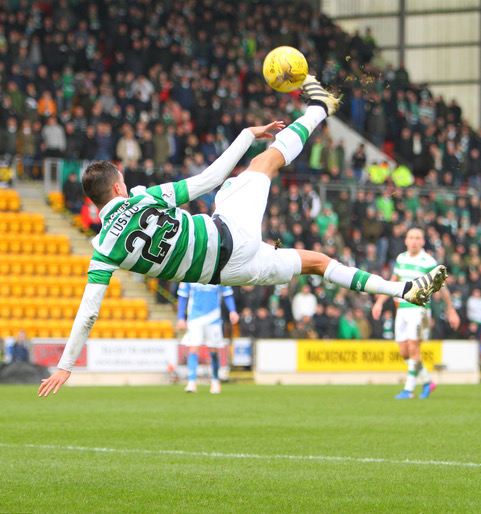
McDiarmid Park would also prove to be the graveyard of McNeill’s successor, Liam Brady, just over two years later. Another two seasons without a trophy – if you discount the Tennent’s Sixes victory in January 1993, the first time my then five-year-old son had witnessed green-and-white ribbons on silverware of any kind – and no sign of an 11-a-side version arriving anytime soon, had left the Irishman a dead man walking. On a wild night in Perth, in October of that year, his Celtic side went down to a 2-1 defeat, a third loss in the opening ten League games. With only two wins in a dismal opening to the do-or-die campaign, Brady resigned the following morning, before the axe came down.
A generation later, back-to-back victories at McDiarmid Park had kick-started the new Jansen regime and the talismanic Larsson’s glorious career at Parkhead. However, just six months after the 10 had been stopped, the Dutchman’s successor as Celtic manager, Jo Venglos, would return home pointless, after another 2-1 reverse in Perth. It was the first time I had managed to get Away tickets for all three of my “Celtic-daft kids,” and we headed excitedly up the A9 in November 1998 to take our place in the Ormond Family Stand. The previous week had been eventful to say the least, following the 4-2 defeat in Zurich and the subsequent resignation of controversial General Manager, Jock Brown, immediately prior to a home game with Dundee, which marked the debut of the so-called “dud Czech,” Lubomir Moravcik. Whilst I had witnessed events first-hand in Switzerland – the unpopular Brown the main target for supporter abuse as he left the team coach before the game – I had missed the Dundee match, to graduate in Paisley, and was pleasantly surprised to hear later how the midfield genius had lit up Celtic Park with a sparkling performance, setting up a hat-trick for Henrik in a 6-1 win, to vindicate his manager and countryman’s faith in bringing him in from MSV Duisburg at the ripe old age of 33. Lubo would not enjoy the same freedom or space at McDiarmid Park the following Saturday, in a game best-remembered for the tremendous assist by another new recruit, Vidar Riseth, whose inch-perfect cross was met at the far post for the winning goal…by Saint Johnstone substitute, Kieran McAnespie! To add insult to injury, this was a second victory over Celtic that season for the newly-promoted Perth side, who had lost 7-0 at Ibrox in their previous outing. Two days after Riseth had signed, he had watched from the bench as Saints recorded their first victory at Celtic Park since September 1971.
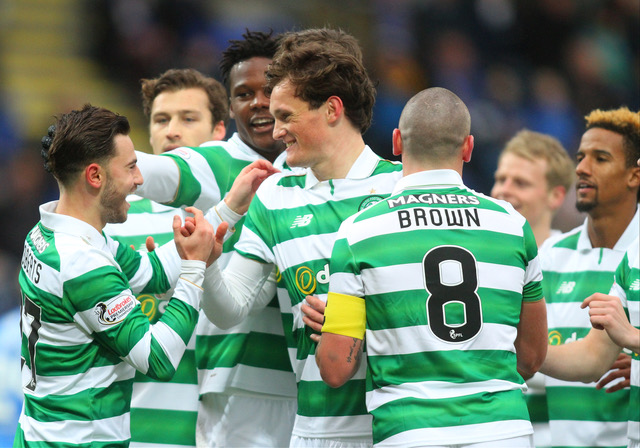
Fast forward another 18 years to Wednesday, 11 May 2016, as my now-adult daughter and I are standing behind the opposite goal for Ronny Delia’s final away game in the Celtic dugout. The title had already been clinched with a 3-2 victory over runners-up Aberdeen at Parkhead three days earlier, the Norwegian then taking the opportunity to hand Ryan Christie a starting debut with teenage full-back Anthony Ralston hoping for the nod from the bench to launch his own first-team career. In the corresponding fixture the previous May, Deila had given promising 18-year-old left-back Kieran Tierney his first outing in a Celtic shirt. That had been a great call. The main story of this night was whether or not Leigh Griffiths could become just the eighth player in the Bhoys’ long history to score 40 goals in a season, and the popular Scotland striker duly obliged, waltzing past several defenders to impudently flick the ball past Zander Clark in the home goal, eight minutes after the break, before promptly plucking one of his kids from the crowd just a few yards to our right, to share in his big moment. That would be it from a Celtic perspective, as the curse of McDiarmid Park struck once more.
As someone once said, the more things change, the more they stay the same. Two minutes after the breakthrough, another Norwegian, Stefan Johansen, decided to emulate his countryman Riseth’s feat of November 1998, the midfielder robbed in his own box to present Saints striker Steven MacLean with a gift he would happily accept. Then, with 12 minutes remaining, we had more comedy defending to endure, Efe Ambrose and Celtic’s new Belgian goalkeeper Logan Bailly colliding whilst dealing with a harmless cross, both men then looking on helplessly, as we did, as St Johnstone substitute Graham Cummins knocked the loose ball into the net to win the match.
It would prove to be Celtic’s last domestic defeat to date. With my own memories of McDiarmid Park mostly negative and painful, I admit to feeling a certain trepidation as we headed back up to Perth nine months later, Sunday, 5 February 2017, to take our seats. It was time to change all that, Brendan.
Speaking of changes, there were three to the starting line-up from the midweek victory over the Dons. In came Erik Sviatchenko, Gary Mackay-Steven and Liam Henderson, with Jozo Simunovic, James Forrest and Callum McGregor dropping to the bench, where they were joined by the returning Moussa Dembele, a sight for sore eyes, and Nadir Ciftci, a rare sight, his first appearance since the Lincoln Red Imps fiasco in July. The Frenchman’s normal striking slot was occupied by another former Fulham star, Patrick Roberts, the popular English loanee celebrating his 20th birthday in a windy Perth.
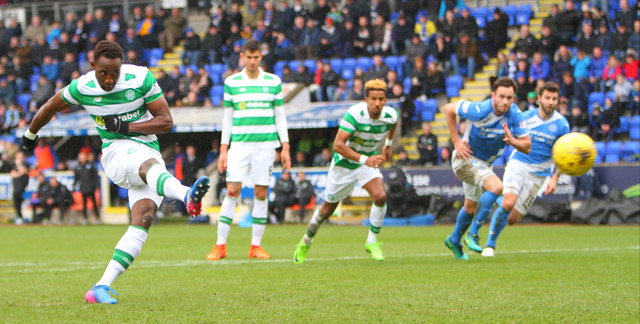
On arrival at the ground, we were treated to the all-too-familiar, crazy and frustrating sight of two half-empty stands along each touchline, whilst Celtic fans scrambled for the available tickets behind each goal plus a small section at one end of the main stand. Perhaps someday, common and economic sense will prevail, and stadia across the country can be properly filled, thus enhancing the product for those in attendance or watching on TV.
Rodgers’ side started, as usual, on the front foot and they were ahead within six minutes, Roberts’ low shot parried by Zander Clark but returned with interest by Henderson for a fine opening goal. Celts then went all-out for the killer second, Mackay-Steven passing up the best opportunity, shooting straight at Clark when sent clean through by Scott Sinclair, before Saints turned the game on its head. On the half-hour, Saints defender Keith Watson towered over everyone to meet a Danny Swanson corner from the right, powering his header into the net, despite the best efforts of Craig Gordon and Scott Brown on the line. Then, just before the break, another Swanson cross is launched in from the opposite flank, Dedryk Boyata’s perfectly-headed finish adding to his recent tally, only this time he has beaten his own keeper to give the hosts the lead. The Invincibles are behind. Here we go. Looks like Celtic are cursed never to win here when I’m in the stadium.
Thankfully, those negative thoughts are dispelled in the second half, triggered by that rarest of events, a soft penalty awarded to Celtic when we are struggling. Brown has survived a loud claim in the Celtic penalty area and Moussa Dembele has replaced Mackay-Steven on the hour before Kieran Tierney makes ground down the left. The Hoops youngster cuts inside Richard Foster before driving his cross into the box, where it strikes Perth goalscorer Watson, first on the hip then his arm, catching the unfortunate defender on the half-turn. Referee Craig Thomson immediately points to the spot and is surrounded by irate St Johnstone players. It is undoubtedly a harsh and major call in the context of this game. Dembele’s first involvement on the pitch is to place the ball on the spot and his second is to blast it high past Clark for 2-2. His 21st Celtic goal of the season. Game on.
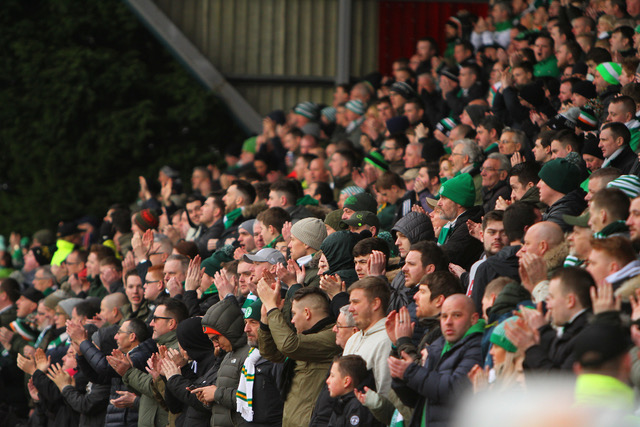
With 15 minutes remaining, the Frenchman notched number 22, this time meeting a Mikael Lustig cutback from the right with an expert, drilled finish into the bottom corner to give the Hoops the lead. Five minutes later, it is game over, as Celts grab a fourth goal. Saints are actually on the attack before Brown plays the ball to Roberts, wide on the halfway line. His control takes him clear of a defender, to pick out Sinclair, lurking on the left-corner of the box. The Englishman is in the form of his life. His confidence is sky-high. There is only one outcome. He takes one touch before giving the Saints keeper the eyes, switching it low into the near post as Clark anticipates a strike across him. 4-2. What curse?
But there is a finale to die for. A masterpiece in the Perth countryside. The stuff of football dreams.
There are five minutes remaining when Celts start passing the ball around for fun. Twenty-plus touches later, Lustig kicks into overdrive, playing “one-two’s” across the St Johnstone penalty area, then creating uproar with an outrageous “Rabona” into the box, where he picks out Callum McGregor. The midfielder adjusts his feet to flick the ball behind him and into the path of Dembele, who completes a 25-minute hat-trick from the bench by calmly placing it across Clark and into the corner. It is one of the greatest team goals I have ever seen. It is scored by my team. Just yards away. A real JFK moment.
There is still time for a cameo appearance by Celtic’s forgotten number seven, Ciftci, replacing Birthday Bhoy Roberts, then a “handbags” incident involving Swanson and Lustig, the Swedish Messi, before Thomson calls a halt to proceedings. It is 19 successive wins and an unbeaten run extended to 29 for Rodgers’ Celts, now a massive 27 points clear of Aberdeen and Rangers, in the race for six-in-a-row.
As expected, the managers had differing perspectives on what they had just witnessed. Saints’ boss, Tommy Wright, not the cheeriest-looking bloke at the best of times, was definitely not a happy bunny.
“My players have done their job, Celtic have done their job but unfortunately the officials haven’t. We actually should’ve had two penalties, if we’re going to be honest. Danny’s [Swanson] is a penalty. I’ve seen it back, thought it was at the time. It was a penalty. When a player contacts a player, makes no contact on the ball in the box, it’s a penalty. You can quite clearly see his left knee gets pushed in, so there was contact [from Scott Brown]and that should’ve been a penalty. Joe Shaughnessy’s dragged to the ground when the ball’s in flight.
The referee blows his whistle, warns the Celtic player. That should’ve been a penalty. And their penalty, if I live to be 100, should never be a penalty. Absolutely, it should never be a penalty. I don’t know how he can give it. I genuinely don’t know how he can give it. I don’t. I’ve been able to shout on to him [referee Craig Thomson]on the pitch and he puts his hands up to me as if he’s caught the ball and it hasn’t. It’s hit his hip and probably touched his elbow. You can see that on the replay. You couldn’t be sure. To give a penalty, you’ve got to be 100% and that’ll be his answer with Danny’s one but certainly not with that [penalty awarded against Watson]. That cannot, should not happen at this level of football. Granted, Celtic could go on and win the game 3-2, 4-2 without that decision because they’ve got so much talent. And they bring on a striker [Dembele] reputedly valued at £40m, a quality player.
And what they’ve got on their bench, and what they had on the pitch. They had started the second half well. We had weathered that storm and the game was quietening down again, which was suiting us. The decision ultimately changes the whole dynamics of the game, gives Celtic a lift. It shouldn’t deflate us a little bit but it probably does. The players are angry and, ultimately, that is a game changer. We did look a real threat. With the ball, we were slightly better than what we had been against them.”
Brendan Rodgers did have some sympathy for his fellow Irishman.
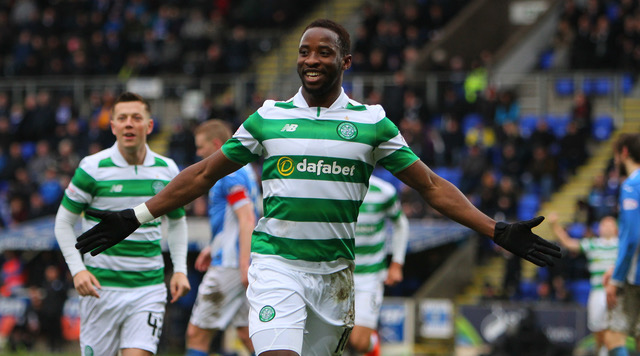
“If I’m Tommy, then you’re obviously bitterly disappointed. You’re 2-1 up. If they can keep hanging in there and hanging in, then you never know what can happen. We get that wee rub of the green. We’ve had other moments when we haven’t had it but if I’m Tommy, I’m disappointed. For us, I’m happy to take it. Great penalty by Moussa and he’s only on the field but then after that we’re really fast and clinical in our game. The last goal was sensational. Mika from right-back has had about six or seven one-twos and great bit of skill, so that shows you the confidence, where the players are at.”
His hat-trick hero, Moussa Dembele, was at pains to dismiss speculation linking him with a move to Chelsea, after being spotted in West London, where he had been undergoing a scan on his injury.
“I am learning at one of the biggest clubs and I’m enjoying it. I don’t really listen to the media. I’m a Celtic player and I’m happy to be here. I try to improve here and show people the player I am and that I’m happy to be here, and I showed that today on the pitch. I can’t tell you that I will be here for 10 years or 20 years. I don’t know. I know the quality of the team, so I know that if we keep playing the way we have all season, we will beat St Johnstone. So, even when we were behind, I was confident. We showed good imagination, we played well and scored five goals, so it is good for us.”
Dembele’s phased return continued six days later, with a starting slot against Inverness Caledonian Thistle, in the fifth round of the Scottish Cup at Celtic Park, the Frenchman and James Forrest replacing Patrick Roberts and Gary Mackay-Steven as Rodgers took no chances by fielding a strong team. The Highland side had previous, in terms of ruining Celtic’s aspirations where the famous old trophy was concerned. Three strikes, in fact.
There was, of course, the “Super Caley Go Ballistic” night in February 2000, which will haunt every one of us unfortunate enough to witness it, and which, ultimately, cost John Barnes both his reputation and his job. And three years later, Martin O’Neill took his UEFA Cup semi-finalists north for a last-eight tie, just days after beating Liverpool at Anfield, the Irishman making eight changes to his victorious line-up and paying a heavy price as Celts were bundled out of the Scottish Cup, thanks to a Dennis Wyness breakaway goal on the stroke of half-time.
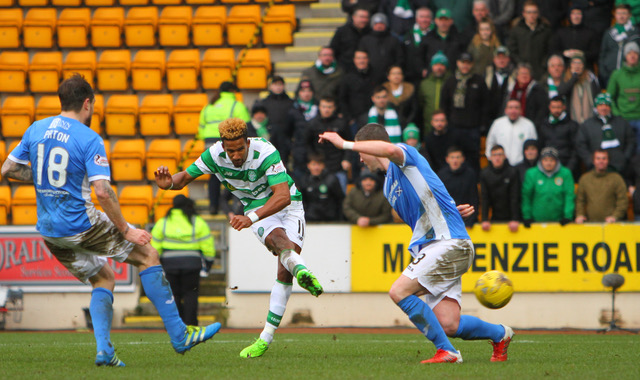
Whilst the blame for each of these could be laid firmly on our own doorstep, the third occasion was something else entirely, Ronny Deila’s side falling victim to perhaps the most astonishing refereeing decision I have ever witnessed. With Celts a goal up and in control of the 2014/15 semi-final, referee Steven McLean and his posse of officials failed to spot Josh Meekings’ blatant handball from Leigh Griffiths’ goal-bound header, which would have put Celtic 2-0 ahead against ten men and, surely, out of sight. Incredibly, no penalty award or dismissal followed. Instead, perversely, early in the second half, a soft spot-kick was given against Celtic keeper Craig Gordon, and he was shown the red card. Greg Tansey converted the penalty and the game went to extra-time, both sides scoring once before, perhaps ominously, a player named David Raven swooped to snatch a late winner for Thistle to deny Deila a potential treble. The fallout was intense and prolonged but to no avail. The result stood.
Celts had actually enjoyed some success against the Inverness side in the competition. In fact, perhaps surprisingly, they had matched the three victories of their opponents, winning in 2007, 2011 and 2012, each time in the Highlands. Of these three games, only the first tends to spring to mind, two goals in stoppage-time from Steven Pressley and Kenny Miller enabling Gordon Strachan’s side to recover from 1-0 down and certain defeat, thus preventing yet another sorry chapter being written in this saga.
There were only around 25,000 hardy souls braving the cold weather to witness the latest instalment, on Saturday, 11 February 2017, pretty much par for the course these days where home domestic cup ties are concerned. However, those who chose to come along were the lucky ones, as they witnessed a free-scoring Celtic side blow the Highlanders away with six of the best to march into the last eight.
Having executed a perfect Rabona in Perth the previous week to set up the fifth Celtic goal, the “Swedish Messi” Mikael Lustig was at it again midway through the first half, racing on to Nir Bitton’s perfect chipped pass before showing skills the Argentinian genius himself would have been proud of, to kill the ball and nutmeg Fon Williams in the Caley goal in one sublime movement. On the stroke of half-time, it was Dembele’s turn to get on the scoresheet, albeit his finish from Forrest’s cutback was much less convincing, his shot misread by the Welsh keeper, who could only look on despairingly as the ball trundled over the line for 2-0.
The young striker then upped the ante after the break, adding two more goals before the hour mark to complete back-to-back hat-tricks. First, he demonstrated great composure to drill the ball home through a defender’s legs after Scott Sinclair had been upended in the box, then he peeled back instinctively to be perfectly placed to head Forrest’s immaculate cross past the helpless Fon Williams. Forrest then repeated the dose with another beautifully stood-up cross which Kieran Tierney gleefully bulleted into the net before the piece de resistance for the final action of the match, skipper Scott Brown picking up a wayward clearance to smash the ball home for 6-0. It could have been anything, to be honest. It had been a devastating display of attacking play by Celtic.
Caledonian Thistle manager, Richie Foran, was honest and succinct with his comments afterwards.
“Outclassed, simple as that. 6-0 is a tough one. We went and had a go at the start and that’s all I could ask from the lads. This is one of the best Celtic teams assembled in a good few years. They’ve got confidence running through their veins. There was no stopping them.”
Whilst his Parkhead counterpart, Brendan Rodgers, had thoroughly enjoyed his afternoon.
“When we had the ball, I thought we were outstanding. The final third, we were so incisive. You see the level of his [Moussa Dembele’s] game. He’s got a natural instinct to score. He’s got a top-class temperament. The value of the team is improving all the time with performing well.”
It was difficult to disagree with the man from Antrim. The unbeaten run now stood at 30 games. We were 27 points ahead of our nearest rivals in the race for the flag, with just 14 games remaining. We were in the last eight of the Scottish Cup and the League Cup, our 100th major trophy, was already resting in the Parkhead boardroom. Even a cautious Celtic man such as myself was beginning to dream.
Matt Corr
Remember when you order a copy of Invincible, Matt Corr will add the personal dedication of your choice and the money will be donated to The Kano Foundation on your behalf. Click on the image below to order.
